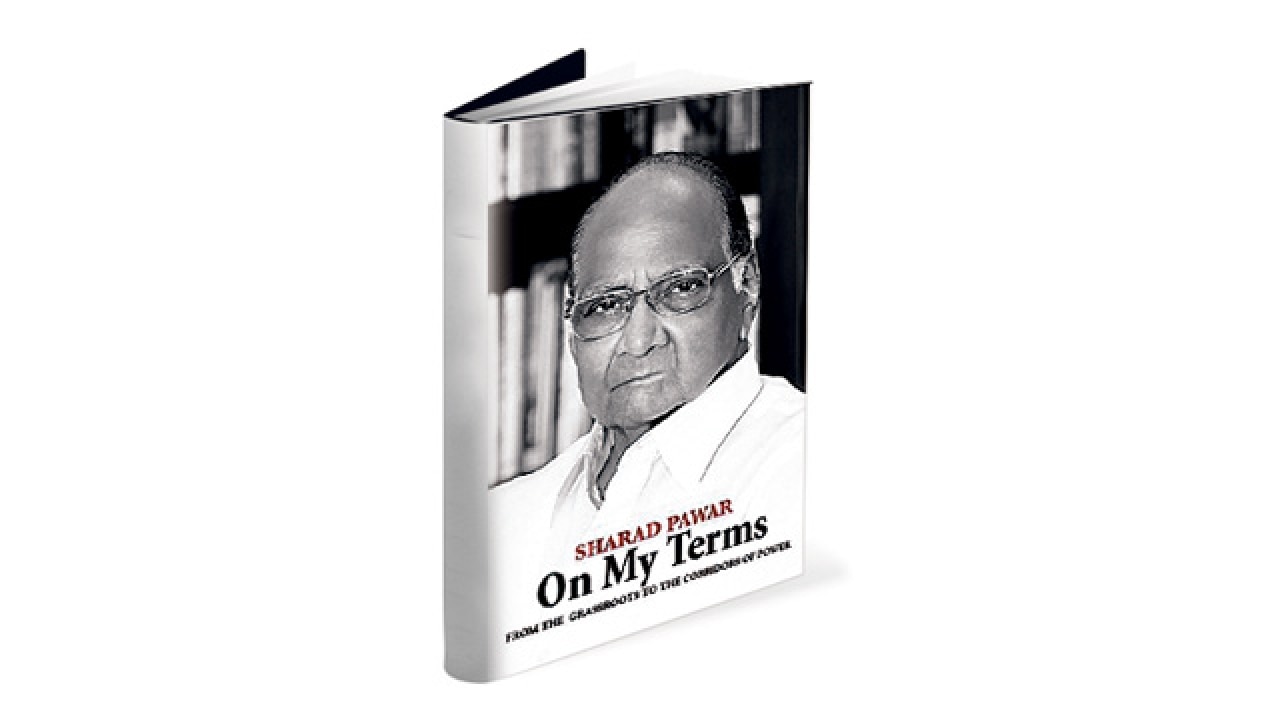
Book: On My Terms: From the Grassroots to the Corridors of Power
Author: Sharad Pawar
Publishing House: Speaking Tiger
Pages: 280
Price: Rs 699
VS Naipaul could well have been referring to memoirs by politicians when he said the autobiography of a writer will always have an incompleteness. For a man whose brush with politics began when he was just three days old, cradled in the arms of mother Sharadabai while she attended a general body meeting of the Pune local board of which she was a member, Nationalist Congress Party (NCP) chief Sharad Pawar's autobiography seems curiously incomplete.
This, from a man who is lauded by his followers as "the best prime minister India never had" and has been in the thick of politics in Maharashtra and Delhi for five decades, is disappointing. Apart from a political memoir, On My Terms: From the Grassroots to the Corridors of Power could have been a ringside view of Maharashtra's changing socio-economic realities.
The former Union agriculture minister has changed his stance almost every decade—became MLA in 1968, joined the Congress under Brahmanand Reddy but split and became the youngest chief minister of Maharashtra in 1978, merged his outfit with the parent party in 1986, was expelled, formed the NCP and patched up in 1999 and again walked out on the Congress before the 2014 state polls. With this book, he seems to have lost out on an opportunity for introspection.
One misses his views on the NCP's humiliating defeat in the 2014 assembly elections, allegations of corruption against his party members, including nephew Ajit, with whom Pawar's relationship is said to blow hot and cold, the rise of Narendra Modi and the leadership of Congress scion Rahul Gandhi.
Despite these drawbacks, however, the book is a must read for any student of politics. From the larger perspective, politicians and policy makers penning their memoirs must be welcomed as their efforts help build institutional memory.
Little known incidents make for interesting reading — like Pawar's backroom parleys helping broker the Rajiv- Longowal accord, his attempts to tackle the Ram Janmabhoomi issue, his refusal to ditch mentor Yashwantrao Chavan, leading to the government being dismissed in 1979 by Indira Gandhi and Rajiv Gandhi refusing to join then Prime Minister Chandrashekhar in his plane two days before his relations with the Congress fell apart.
There are another anecdotes that enrich this account. Like Rajiv Gandhi engineering a revolt against Pawar in 1990 but later admitting he had "asked them to shake the tree, not uproot it", Sonia Gandhi loyalists hampering his chances to be the prime minister in 1991, the handling of the 1993 serial blasts and the subsequent conditional surrender proposal by underworld don Dawood Ibrahim.
While admitting that his relationship with Sonia Gandhi was awkward with "little warmth", Pawar details how the differences led to him, Tariq Anwar and PA Sangma being expelled from the Congress and culminating in the formation of the NCP in 1999. But there is no reference to how the defeat of former Union home secretary and Congress candidate Ram Pradhan in the 1998 Rajya Sabha polls from Maharashtra amid immense cross-voting brought differences in the party to a boil; Pradhan was Sonia's nominee.
The four-term chief minister of Maharashtra provides an insight on the gradual shrinking of democratic space within the Congress, and notes that Indira Gandhi's infamous Emergency met with support from an unexpected quarter — the Shiv Sena. More inside details on how the Sena tiger was tamed would have been welcome.
Pawar's opinion about persisting with caste-based reservations only at entry level and not in promotions may ruffle feathers, especially because the Congress and NCP had pushed through controversial quotas for Marathas and Muslims in Maharashtra before the assembly polls.
Incidentally, a scathing chapter about the Congress-led UPA government, in which Pawar was the agriculture minister for a decade, is included in the Marathi version Lok Mazhe Sangati, but is missing from the English edition. Pawar also drops a bombshell in the Marathi version, about him and colleague Praful Patel deciding to resign in protest against policy paralysis but withdrawing after prime minister Manmohan Singh's intervention.
Why was this chapter, critical of Singh and Sonia, dropped from the English edition? A discerning reader cannot help but speculate if this has a connection with the 2017 presidential race in which Pawar is said to be in the reckoning.
While attempting to clear the air over "widely circulated myths" like him being the richest politician in the country, Pawar puts up a defence against allegations that he extended "patronage" to controversial musclemen-turned-politicians Hitendra Thakur and Pappu Kalani. Incidentally, Kalani's wife Jyoti is an NCP MLA from Ulhasnagar.
Pawar has not written in detail about the reasons for agrarian distress and farmer suicides in Maharashtra, which coincided with his tenure in the agriculture ministry, or about the state's lopsided development model whose inequities are coming to the fore. Pawar's observation about the BJP being able to expand its reach when it is flexible on Hindutva and the danger of the party losing out on the middle-class constituency may ring true in the coming years.
Among these are some impressive accounts, one of which is about Pawar's mother Sharadabai. An enlightened woman, who did not confine herself to home and hearth, Bai, as she was called by her children, was grievously gored by an injured bull in a freak accident, leaving her crippled. However, this did not stop her from learning how to drive a car and learning English to communicate with her British daughter-in-law!
An account of Pawar's fight against cancer, an impressive portrayal of Chavan, the cultured politician, who was Maharashtra's best bet for the country's top job but lost his chance twice (1966 and 1979) are the book's plus points.